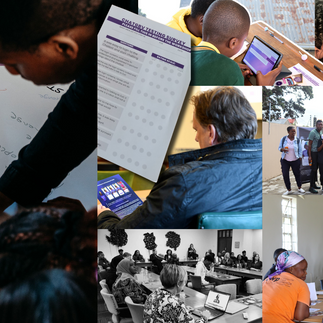At GRIT, being survivor-centered informs all of our work because we believe that without this approach, we cannot meaningfully tackle GBV. But we don’t always get it right. As a relatively new organization in the GBV space, we are still learning about what it means to be survivor-centered. We've learned some hard lessons, especially when we've tried to stretch beyond our resources and expertise, ultimately leaving some of the survivors we work with feeling let down. We acknowledge these mistakes. We want to do better.
We want to encourage the survivors we have worked with, and those we will work with in the future, to give us feedback so that we can do everything we can to improve our survivor support.
A survivor-centered approach is one where the survivor is at the core and forefront of everything we do. It is a commitment to recognize that the survivor is the expert in their own life and that they need to be afforded the dignity and respect to drive their own journey. It’s an approach that means building a relationship with the survivor that prioritizes their emotional and physical safety and sits with them in the process of regaining control and exercising their autonomy.
Put another way, a survivor-centered approach means acknowledging that the survivor is the one driving the car and that GRIT is in the passenger seat. Our role is to check the GPS, provide snacks, manage the aux cable, and offer the occasional comment about the road ahead. Being survivor-centered means that it is the survivor who is in control of the journey, the car, and their role within that.
Here are some of the lessons we have learned recently:
1.Back-Seat Driving
Part of our role is to offer resources and guidance so that the driver can have the information and the ability to make their choices. Often, we don’t have all the resources we would like. Sometimes we need to offer guidance on processes that can be painful for the survivor to go through or hard to navigate. Being survivor-centered in these contexts means knowing that it is not our role to tell the survivor how to drive, even when we think we fundamentally know better or have been driving longer. Backseat driving or telling the survivor what to do is unhelpful and harmful. Backseat driving is another way of reinforcing how violence and trauma make the survivor feel powerless. It tells the survivor that we do not believe in their abilities and this can be very harmful.
2. Arguing Over the Directions
Being in the passenger seat sometimes means that you will not agree with the survivor on the direction they’re traveling in. Being survivor-centered means respecting that it’s not about your preferences. This is perhaps one of the hardest lessons. Especially when their mental health can influence choices in ways that could cause them or others further harm. We aim to support all survivors of GBV. Sometimes this means knowing when we do not have the resources or expertise to deal with complex mental health challenges and working to ensure that we connect them to organizations better suited. Being survivor-centered in these cases might mean we need to have the hard conversation about how their driving might negatively impact their emotional or physical health. It might mean it’s time to get out of the car and strongly advocate for them to find a driver who can best travel with them in the direction they are traveling in. A hard lesson in being survivor-centered is knowing when you do not have the resources or qualifications to help.
3. Managing Road Rage
Accessing the traditional criminal justice system or other support organizations can often leave survivors feeling frustrated and let down. Since South Africa’s transition from apartheid to democracy, there has been a significant push to make the criminal justice system more victim-friendly. Despite these efforts, the structure of the traditional system just isn't geared towards a survivor-centered approach. From the moment a survivor opens a case of SGBV, they lose control over much of the process and decision-making. The system often views the victim merely as a witness to a crime. This, rather than recognizing them as a human being who has survived violence. This approach is not only upsetting but also disempowering, and it often leaves survivors feeling angry. Our role as survivor-centered supporters is to sit with the survivor in these feelings and help them work through them. It might mean supporting a survivor to lay complaints or seek help elsewhere.
4.Letting Go of the Wheel: A Conclusion on Survivor-Centered Support
Our feminist principles and unwavering commitment to survivor well-being demand a critical truth: we are not perfect. Mistakes happen, and in the context of GBV work, the consequences can be devastating but we are dedicated to managing these missteps with transparency and a commitment to deep reflection. This is especially true for those of us who, like the womxn in our organization, have been on both sides of the journey – drivers and passengers. Upholding a survivor-centered approach is paramount, even when it requires relinquishing control, a challenge we actively embrace.
There will be situations where survivors require specialized support beyond our capacity. In such cases, we will act as a carpool lane, connecting them to organizations with the expertise and resources to address their unique needs. After all, true survivor-centered care means ensuring they have access to the most effective support available, even if it comes from elsewhere. We are committed to upholding the survivor-centered approach and learning from it, especially when it is difficult to let go of the steering wheel.
📲 Download our safety, reporting and evidence-storing app (Kwanele for now still) on Google Play or Apple Store
💙 Reach out and message us via our Whatsapp line at tel:0727378819.



















Comments